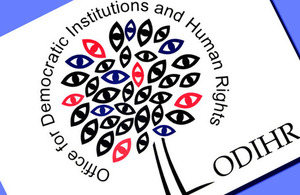UK Statement to the OSCE on Elections
Organization for Security and Co-operation in Europe holds its Human Dimension Implementation meeting, Warsaw, Poland

Office for Democratic Institutions and Human Rights logo
1 October 2013
The UK fully aligns itself with the statement made by Germany on behalf of the EU. Given the importance that the UK government attaches to preserving the independence and integrity of ODIHR’s election observation methods, we thought it worth taking the time to make a few remarks to explain why we are proud of ODIHR’s globally respected signature activity.
I will start with a concrete recommendation to the participating States.
States should focus on ensuring compliance with and implementation of OSCE election related commitments and should support rather than question ODIHR’s election observation methodology.
Returning to why we support ODIHR’s elections work:
-
We, like all other participating States, have tasked ODIHR to carry out this work through a number of commitments. The Copenhagen document in particular represents one of the most comprehensive international documents on the conduct of democratic elections. Its strength flows from having captured our shared understanding that a fully democratic election is not just about what happens on polling day but that it should cover the entire electoral process.
-
ODIHR’s election observation methodology is consistent, systematic and facts-based, enabling objective findings and authoritative conclusions to be reached.
-
ODIHR election observation is non-political. Its conclusions deal only with the electoral process not the political outcome.
-
ODIHR’s work is transparent. ODIHR’s Needs Assessment mission reports, its interim reports, preliminary assessment statements and final reports are all publicly available. This is transparency in action.
-
Its methodology is transparent. We all tasked ODIHR at the Budapest Summit in 1994 to develop a framework and handbook for election monitoring. This is precisely what they did and its successive editions set out in great detail ODIHR’s working methods and have informed the practices of many international and domestic observer groups.
-
Observers are deployed on the basis of a tried and tested methodology. Great care and attention is applied to each Needs Assessment Mission to ensure that the number of recommended observers is sufficient to provide for broad, balanced geographical coverage in order to conduct comprehensive and meaningful observation before, during and after election day. We are completely against suggestions made by some in the past that there should be a standard number of observers for every election that ODIHR observes. Such an arrangement would run contrary to its mandated task of carrying out its work in an independent, impartial and professional way. It would also be an inefficient use of resources.
Time does not allow for a more extensive description of the strengths of ODIHR’s election observation work. But we felt it important to again place on record our pride in the international standard set by ODIHR. No participating State has a perfect record when it comes to conducting elections. All of us can make improvements including based on advice and recommendations made by ODIHR. We call on all participating States to recognise the real difference that ODIHR’s election observation continues to make to our common goal of democratic societies based on free elections and the rule of law. Thank you.
Follow us on Twitter: @UKOSCE